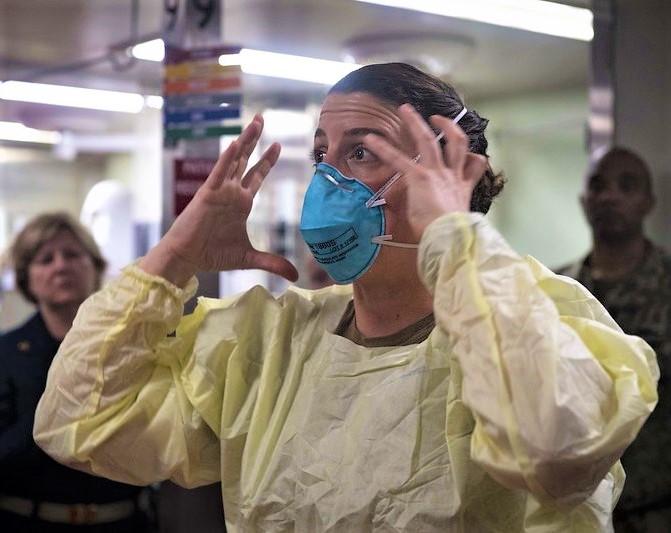A new report from the Center for Strategic and International Studies (CSIS) comments on the "ineffectual and fragmented" US COVID-19 pandemic responses thus far and recommends eight steps to manage the ongoing crisis amid variant fatigue, inflation, and supply chain disruptions.
CSIS, a bipartisan, nonprofit policy research organization based in Washington, DC, said it issued the recommendations to secure US global leadership in the next phase of the pandemic response.
Among the steps recommended in the "2022 is the year of decision" report are to launch a US international pandemic readiness project and to appoint a presidential global health security envoy.
Managing the pandemic crisis and preparing responses to future threats will not be easy, owing to widespread exhaustion, depleted workforces, and a healthcare system on the brink, the report authors said. The world was still battling the Delta (B1617.2) variant when Omicron (B.1.1.529) swept in.
"Omicron's apparent reduced severity may induce complacency that could in turn fuel further mass infection," they wrote. "Too many people are simply unwilling to accept vaccines."
Focusing on responses to future crises
The report authors commented on persistent global COVID-19 vaccine, testing, and treatment inequities. "As the wealthiest and most powerful countries advance boosters and the vaccination of children, low- and middle-income countries face a 3 billion dose vaccine gap in 2022, according to the World Health Organization (WHO)," they wrote.
"Inequities create vulnerabilities for all, including Americans who are fully vaccinated and boosted and young children who are not yet eligible to be vaccinated."
The authors noted that Operation Warp Speed, the program that supported the rapid development of COVID-19 vaccines, demonstrated the power of political will, resources, oversight, and concentrated decision authority in terms of the Defense Production Act.
But marshalling that sort of synergy is more challenging now because the pandemic has lasted longer than some people expected. "That means acknowledging the uncertainty about the time it will take to gain control over SARS-CoV-2 and focusing beyond just the current phase to investing adequately against future threats," the authors wrote.
Eight recommendations, point by point
CSIS's recommendations are to:
- Launch a 5-year US international pandemic preparedness project with concrete targets, a prioritization of partner countries and institutions, a clear action plan, and a permanent leadership structure, with a budget of $18 to $20 billion a year.
- Appoint a presidential global health security envoy to be based at the Department of State to lead development of the US initiative, work with Congress, coordinate interagency action in partnership with the White House, and expand diplomatic engagement with key allies, international institutions, and regional bodies.
- Make COVID-19 vaccines the cornerstone of the US and international response to ensure an affordable, timely supply to COVAX and regional and key partners states, shore up delivery capacity, debunk misinformation, confront vaccine hesitancy, and foster new regional production partnerships with vaccine makers.
- Prioritize COVID-19 tests and therapies with a "test and treat" approach, support development and deployment of therapies to prevent and treat infections, and designate an agency to lead distribution and proper use of treatments in developing countries with the support of multiyear budgets.
- Develop strategies for development of future tests, treatments, and vaccines, with US and international monitoring and surveillance modernization. This includes fostering US-European Union (EU) cooperation, especially between the Biomedical Advanced Research and Development Authority (BARDA) and the new EU Health Emergency preparedness and Response Authority (HERA), and supporting the Coalition for Epidemic Preparedness Innovations (CEPI).
- Establish and resource a pandemic fund and high-level leaders council, with political and financial backing from other G20 nations and funding from Congress.
- Integrate the US Department of Defense's roles and funding authorities into the US international initiative using dedicated resources.
- Encourage the Biden administration to nurture a better relationship with China that would lead to discrete health security improvements for reasons such as travel, public health infrastructure, information sharing, and supply chains.
"Continuing to build much more muscular US leadership remains the sine quo non both for achieving greater order and equity in the global response, including galvanizing other countries, international institutions, the private sector, civil society, and foundations to act with the urgency that the moment demands," the authors concluded.






















